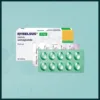Rybelsus 7 mg (Semaglutide)
What is Rybelsus 7 mg?
Rybelsus 7 mg is an oral medication used to help control blood sugar levels in adults with type 2 diabetes mellitus. It contains Semaglutide, a GLP-1 receptor agonist, which mimics the natural hormone GLP-1 (glucagon-like peptide-1) that helps regulate blood glucose levels.
Rybelsus is the first and only GLP-1 medication available in tablet form, offering a convenient alternative to injectable diabetes treatments like Ozempic (also Semaglutide). The 7 mg strength is typically used as the maintenance dose after beginning with a 3 mg starting dose. It is often prescribed as part of a broader diabetes management plan that includes diet, exercise, and lifestyle changes.
Rybelsus is not for treating type 1 diabetes or diabetic ketoacidosis, and it is not a substitute for insulin in those who need it.
How Does Rybelsus Work?
Rybelsus works by mimicking the effects of GLP-1, a hormone released naturally in the body in response to food intake. GLP-1 helps control blood sugar through several mechanisms:
-
Stimulates insulin secretion when blood sugar is high.
-
Reduces glucagon levels, a hormone that raises blood sugar.
-
Slows gastric emptying, which helps prevent post-meal blood sugar spikes.
-
Promotes satiety, which can reduce food intake and support weight loss.
These combined actions help maintain more stable blood glucose levels throughout the day and reduce A1C levels (a long-term marker of blood sugar control).
Benefits of Rybelsus 7 mg
-
Improves Blood Sugar Control: Rybelsus helps lower fasting and post-meal blood glucose levels, reducing A1C levels significantly.
-
Weight Loss Support: Many users experience moderate weight loss, making it a dual benefit for overweight or obese patients with type 2 diabetes.
-
Oral Option: Unlike most GLP-1 drugs, Rybelsus is a tablet, making it more accessible for people who prefer not to take injections.
-
Cardiovascular Protection: Semaglutide has shown potential in reducing cardiovascular risk in patients with diabetes and heart disease.
-
Easy Dosing: Taken once daily, it simplifies treatment routines.
-
Tolerable Side Effect Profile: Gastrointestinal side effects are most common but often diminish over time.
How to Take Rybelsus 7 mg
To get the most from Rybelsus, follow these important instructions:
-
Dosage: The standard schedule starts with 3 mg once daily for the first 30 days, then increases to 7 mg once daily.
-
Administration: Take on an empty stomach, with no more than 4 ounces (about half a glass) of plain water.
-
Timing: Wait at least 30 minutes before eating, drinking anything other than water, or taking any other oral medications.
-
Swallow whole: Do not chew, crush, or split the tablet.
Your doctor may later increase the dose to 14 mg daily if additional blood sugar control is needed.
Who Makes Rybelsus?
Rybelsus is manufactured by Novo Nordisk, a global pharmaceutical company based in Denmark. Novo Nordisk is a leader in diabetes care and produces other well-known medications such as:
-
Ozempic (injectable Semaglutide)
-
Victoza (Liraglutide)
-
Levemir and Tresiba (long-acting insulins)
The company is known for its commitment to innovation, quality, and improving outcomes for people with diabetes worldwide.
Is Rybelsus Safe for Humans?
Yes, Rybelsus is considered safe and effective for human use when prescribed and monitored by a qualified healthcare provider. It has received approvals from major health authorities, including the:
-
U.S. Food and Drug Administration (FDA)
-
European Medicines Agency (EMA)
-
Regulatory bodies in many other countries
However, like any medication, it must be used with caution in specific individuals:
-
Those with a history of pancreatitis
-
People with severe gastrointestinal disease
-
Individuals with kidney or liver problems
-
Those with personal or family history of medullary thyroid carcinoma (MTC) or multiple endocrine neoplasia syndrome type 2 (MEN 2)
-
Pregnant or breastfeeding women (safety not established)
Side Effects of Rybelsus
Most side effects are gastrointestinal in nature, especially when starting or increasing the dose.
Common side effects include:
-
Nausea
-
Diarrhea
-
Vomiting
-
Stomach pain
-
Constipation
-
Loss of appetite
Less common but serious side effects:
-
Pancreatitis: Severe stomach pain that may radiate to the back.
-
Hypoglycemia: Especially when used with insulin or sulfonylureas.
-
Kidney problems: Often due to dehydration from vomiting or diarrhea.
-
Allergic reactions: Rash, swelling, or difficulty breathing.
-
Thyroid tumors (seen in animal studies; relevance to humans uncertain).
If you experience severe abdominal pain, persistent nausea, or signs of a serious allergic reaction, seek immediate medical help.
Disclaimer
This article is for informational purposes only and should not be taken as medical advice. Always consult a qualified healthcare provider before starting, stopping, or changing any medication, including Rybelsus 7 mg. Your doctor will determine the appropriate dosage and monitor for side effects or interactions with other treatments.







Reviews
There are no reviews yet.